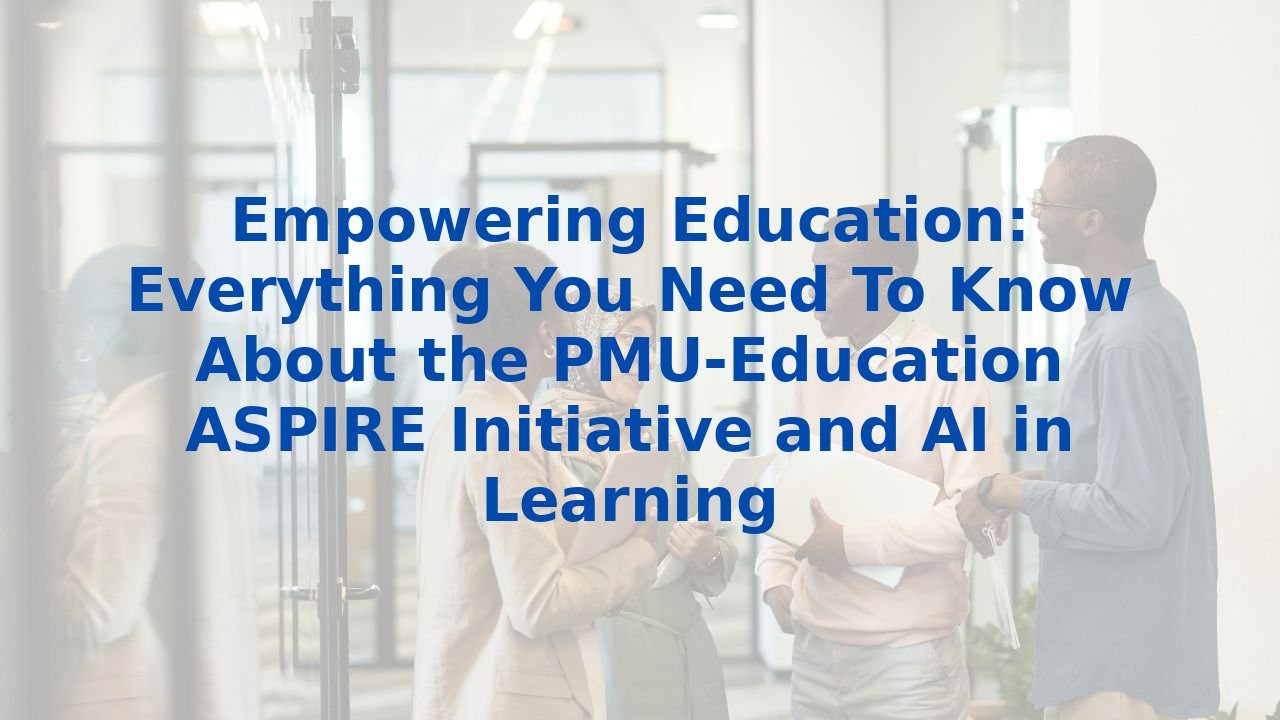Empowering Education: Everything You Need To Know About the PMU-Education ASPIRE Initiative and AI in Learning

Empowering Education: Everything You Need To Know About the PMU-Education ASPIRE Initiative and AI in Learning
Introduction
In a world where technology is progressing at an astonishing pace, education is being fundamentally transformed through the embrace of artificial intelligence (AI). The PMU-Education ASPIRE initiative stands as a beacon, signaling the potential of AI to revolutionize the learning experience. This post delves into how business processes in education can harness AI to unlock unprecedented efficiency and effectiveness, creating a seamless space for both educators and learners.
Personalized Learning: The Heart of AI in Education
Embracing AI allows educators to offer personalized learning experiences, catering to each student's unique pace and preferences. By employing algorithms that analyze real-time responses, AI systems can adjust the curriculum to meet the needs of every individual. Imagine an educational landscape where students are not homogenously treated; instead, they embark on customized learning journeys that adapt as they progress. This level of personalization not only enhances understanding but also ignites engagement, leading to superior outcomes.
Enhancing Administrative Efficiency
Administrative burdens often stifle educational innovation. AI streamlines routine tasks such as grading, scheduling, and performance tracking, freeing up educators to focus on what truly matters—teaching and mentoring their students. Automated grading software, for instance, ensures consistent and objective evaluation of student work, while intelligent scheduling tools optimize class times and resources. By integrating AI into these processes, educational institutions can significantly increase their operational efficiency, enabling a shift towards a more dynamic and interactive learning environment.
Accessibility for All
AI's ability to enhance accessibility cannot be overstated. With the introduction of assistive technologies, education becomes a more inclusive space for students with disabilities. Technologies that transcribe speech into text, provide personalized educational games, or even adapt learning materials to diverse needs help level the playing field. By breaking down barriers and facilitating access to high-quality resources, AI fosters equity in educational opportunities, ensuring that every learner can thrive.
Continuous Assessment and Real-Time Feedback
Traditional assessment methods often leave students without timely feedback on their progress. AI transforms this dynamic by enabling continuous assessment models that provide instant insights into each student’s strengths and areas for improvement. Educators can utilize real-time analytics to adapt their instruction, deploying targeted resources in response to the evolving landscape of student performance. This continuous feedback loop not only supports student progress but also allows educators to adapt their strategies swiftly, fostering a more responsive educational framework.
Building Essential Skills for the Future
The educational journey is not just about acquiring knowledge; it’s about developing crucial skills that are essential in the modern workforce. AI fosters critical thinking, creativity, and problem-solving capabilities in students. By integrating interactive AI-driven environments and simulations, educators can create immersive experiences that challenge students to think beyond traditional paradigms. This approach not only enhances engagement but also equips learners with the competencies that will define future job markets.
The Importance of Training for AI Integration
For educational institutions to fully capitalize on AI's potential, it is imperative to invest in training programs for educators. Understanding the intricacies of AI tools is essential to their effective implementation. Training ensures that educators can integrate AI responsibly, fostering trust and transparency. Moreover, when educators are equipped with the necessary skills, they can effectively bridge the gap between technology and pedagogy, ultimately enhancing the quality of education delivered.
Conclusion
The PMU-Education ASPIRE initiative, alongside the broader integration of AI, represents a significant leap forward in redefining the educational landscape. AI’s promise of personalized learning, administrative efficiency, and enhanced accessibility positions it as an essential component of modern education. However, as we delve deeper into the future, prioritizing employee training is crucial to navigate the challenges of responsible AI use. By cultivating an environment where AI complements traditional educational methods, we empower both educators and students, paving the way for a richer, more inclusive learning experience.
In embracing these transformational changes, we not only enhance educational practices but also prepare students to thrive in a rapidly evolving world. The future of education is bright, and with AI as a guiding force, there’s no telling how far we can go.